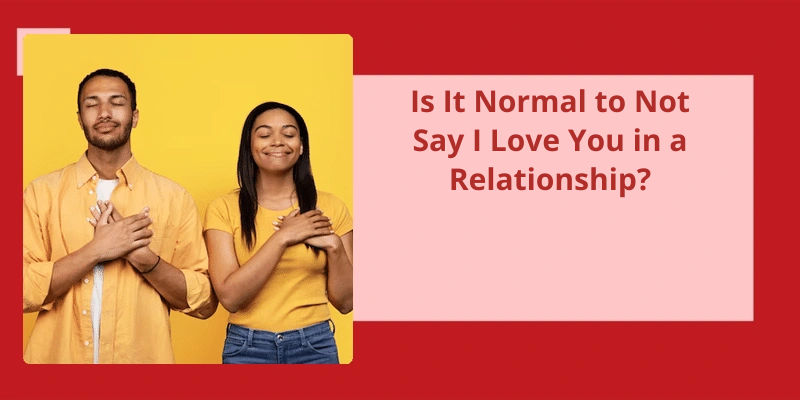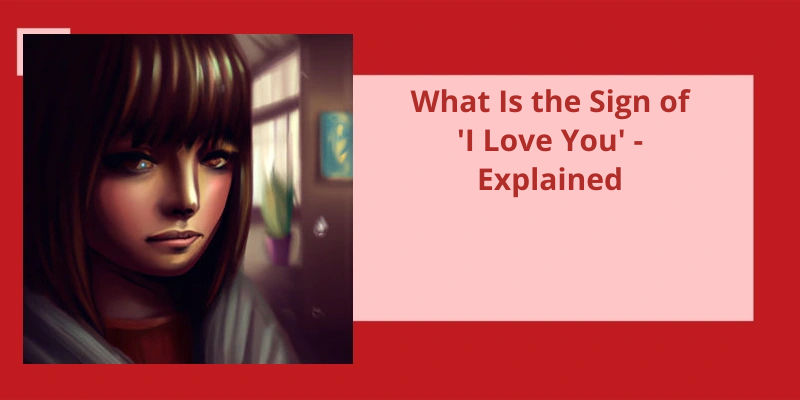However, there are also those individuals who may never say “I love you” during the entirety of the relationship. It's a common concern that people who aren’t verbal about their affection are less invested in their relationships. But is it normal to not say “I love you” in a relationship? The answer isn’t as simple as yes or no. It's a case-by-case basis that depends on the individuals involved and the dynamics of their relationship. It's essential to explore why someone may not feel comfortable expressing their love verbally and how to navigate these situations without compromising the love and intimacy two partners share.
Do Some People Not Say I Love You a Lot?
It wasnt that he didnt care or appreciate her, but he simply wasnt someone who expressed his emotions verbally. Jessica found it difficult to understand at first, especially since she was used to hearing those words often in her previous relationships. However, she soon learned that his actions spoke louder than words, and that he showed his love in other ways.
Likewise, there are many people who struggle with expressing their emotions, whether it’s due to their upbringing, personality traits, or past experiences. Some individuals fear vulnerability and being rejected, while others may feel uncomfortable with displays of affection. It’s important to recognize that everyone expresses themselves differently and not to take it personally if someone doesn’t say “I love you” often.
It’s also worth noting that there are cultural norms and expectations surrounding the phrase “I love you” that can vary depending on upbringing and societal values. In other cultures, expressing love through actions rather than words is more common.
Ultimately, the frequency with which someone says “I love you” shouldnt be used as the sole indicator of their feelings or commitment. As Jessica discovered, actions such as spending quality time, performing acts of service, and showing affection in other ways can be just as meaningful. Communication and understanding each others love languages is key in any relationship, whether it’s romantic or platonic.
It’s important not to make assumptions about someones feelings based on the frequency of their verbal expressions of love. Showing love through actions and understanding different cultural values surrounding romantic and platonic relationships can go a long way in fostering meaningful connections. It’s also important to communicate with loved ones about what makes them feel valued and appreciated, and to express love in ways that resonate with them.
When it comes to expressing love in a relationship, there’s no hard and fast rule. While some couples may choose to say “I love you” every day, others may not feel the need to express it verbally all the time. The frequency of saying these three words should depend on your personal preferences and your partner’s as well. It’s important to find what works best for your relationship without feeling obligated to fit into society’s norms.
Is It Okay to Not Say I Love You?
However, it’s important to keep in mind that not everyone expresses love in the same way. Some people may show their love through actions rather than words, and that’s completely okay. Additionally, saying “I love you” doesn’t necessarily mean that someone truly feels that way. It’s possible for someone to say these words without really meaning them.
It’s also important to consider the context in which the phrase is being used. Saying “I love you” to a romantic partner is different than saying it to a friend or family member. It’s natural for different relationships to have different levels of emotional intimacy and expression. It may not be necessary or appropriate to say “I love you” in every relationship.
It’s also worth noting that there are many other ways to express love and affection besides saying “I love you.”. Some people may prefer to show their love through gifts, acts of service, quality time, or physical touch. Each person has their own love language, and it’s important to understand and respect that in order to strengthen relationships.
The frequency and manner in which someone expresses love is a personal preference. Ultimately, the most important thing is to show love and respect to those around us in whatever way feels most genuine and comfortable.
The Potential Consequences of Saying “I Love You” Insincerely.
- Hurt feelings
- Loss of trust
- Damaged relationships
- Decreased intimacy
- Confusion and uncertainty
Remember that expressing love is a sensitive matter that should be handled with care and thoughtfulness. While it’s important to let your loved ones know how you feel, it’s equally important to choose the right moment to do so. Timing is everything when it comes to expressing love and it can make or break the relationship. Not everyone is ready to hear those three little words, so be sure to gauge the situation and know when it feels right to share your feelings.
When Should You Not Tell Someone You Love Them?
While expressing love can be a beautiful thing, it’s important to consider the timing of the confession. In certain situations, it isn’t appropriate or advisable to tell someone you love them. For example, telling someone you love them on a first date or even after just a few weeks of dating can put unnecessary pressure on the relationship and may even turn the other person off.
It’s also important to ensure that the person you’re telling you love them has genuine feelings for you. If your affection is one-sided, it can be hurtful and uncomfortable for the other person to hear. It’s important to take the time to build an emotional connection and ensure that both parties are on the same page before expressing deep feelings.
Similarly, if you’re unsure of your own feelings, it may not be the right time to share them. Telling someone you love them when you’re unsure can lead to confusion and hurt feelings down the line. Take the time to evaluate your own emotions and ensure that you truly love the person before expressing your feelings.
It’s also important to consider the circumstances of the relationship. If you recently ended a relationship or the other person is going through a difficult time, expressing your love may not be appropriate. It’s important to be respectful of the other persons feelings and give them space to heal before making any big declarations of love.
Finally, it’s important to consider the other persons feelings and avoid putting them in a difficult position. It’s important to respect the other persons boundaries and accept their response, even if it isn’t what you were hoping to hear.
The Importance of Timing When Expressing Love in a Long-Term Relationship.
- Timing can make or break a relationship
- Expressing love at the wrong time can lead to misunderstandings and hurt feelings
- It’s important to choose a time when both partners are receptive and open to receiving love
- Timing can also depend on the particular situation and the nature of the relationship
- Being aware of each other’s schedules and moods can help in choosing the best time to express love
- Communication is key in understanding each other’s needs and preferences regarding timing
- Expressing love consistently over time can help build a strong and lasting relationship
Relationships can be complex, and there’s no set time frame for when you should express your love for your partner. It’s important to take the time to evaluate your feelings and ensure that you’re ready to take the next step in your relationship. With that said, let’s take a closer look at whether six months is too long to wait before saying “I love you.”
Is 6 Months Too Long to Not Say I Love You?
, one of the most common relationship queries on the web was, “Is 6 months too long to not say I love you?”. It’s a fact that there’s no definitive timeline to say “I love you” in a relationship. However, it’s crucial to consider a few factors while addressing this query. First and foremost, your relationships pace matters when it comes to expressing emotions like love. If your relationship is slow and comfortable, then six months may be too long.
Another critical aspect to consider is communication. Instantaneous communication, such as texting, talking over the phone, or video calls, has become the norm in todays dating culture. However, digital communication can also mask underlying feelings rather than reveal them. Therefore, it’s essential to determine if your partners silence after six months of dating represents disinterest or merely communication style. Not everyone is vocal about their emotions at all times.
Moreover, some people may have experienced challenges in past relationships and subsequently may be hesitant to express their emotions. Therefore, waiting a little longer to say “I love you” could be a prudent decision. At times it takes longer to trust your partners intentions. This could mean taking your time, allowing the relationship to grow and seeing if youre comfortable and happy in the long run. These are reasonable grounds for not saying it early on in any relationship.
Also, it’s advisable to understand that every relationship is unique, and each partner has contrasting personal standards of expression, which may take time to establish. It’s imperative to focus on being present in the relationship and cherishing the present moment rather than getting lost in timelines and expectations.
It’s all relative to the pace, communication style, and individuals personal experiences. Rather, couples should focus on building a healthy, respectful, and satisfying relationship by allowing emotions to grow organically rather than forcing a timeline.
The Role of Cultural and Societal Expectations in Expressing Love in a Relationship.
- Cultural expectations can shape how individuals express love in a relationship
- Societal norms may dictate what actions are considered appropriate or acceptable in expressing love
- These expectations and norms can vary greatly across different cultures and societies
- Individuals may feel pressure to conform to these expectations, even if they don’t align with their personal beliefs or feelings
- Communication and understanding between partners can help navigate and challenge these expectations
- Ultimately, expressing love should be a personal and mutual decision between partners, rather than solely influenced by external factors
Expressing your feelings to someone for the first time is a big step in any relationship, but it’s important to consider the timing carefully. While saying “I love you” can bring you closer, it can also have negative consequences if not said at the right time. Reactions can vary depending on the recipient’s feelings, expectations, and other factors that may be influencing the relationship. So, is there a bad time to say “I love you”? Let’s explore some possibilities.
Is There a Bad Time to Say I Love You?
It’s important to remember that saying “I love you” should come from the heart and not as a way to manipulate someone into doing or feeling a certain way. It’s crucial to take your time to wait for the right moment and be confident that this is what you truly feel towards the other person.
Timing is everything when it comes to expressing your love to someone. Saying “I love you” too soon in a relationship can make the other person feel pressured to reciprocate the feelings they may not yet have. It may also indicate to them that those three words are thrown around lightly and without meaning. On the other hand, waiting too long to say those powerful words can make the other person doubt where they stand in the relationship, leading to feelings of insecurity and uncertainty.
The context and setting of where you choose to express your love are also significant. Saying “I love you” in private could be more intimate and less pressure-filled than if you were to do it in front of others, such as at a family gathering or work event. Choosing a neutral, relaxed environment can also help put both parties at ease.
In some cases, there are situations where it may not be the best time to say “I love you.”. For example, if the other person is going through a stressful time or dealing with personal issues, expressing your love may not be the top priority. It’s essential to be mindful of the other persons emotional state and to choose the right moment to express your feelings thoughtfully.
It’s important to remember that love comes in many forms and sometimes needs to be expressed differently than simply saying those three powerful words. It’s up to you to choose the right time and place to express your feelings and make someone feel truly loved and appreciated.
Conclusion
It's important to remember that love is a complex emotion that can develop differently for each individual. Communication and understanding between partners is key, as it can help ensure that each person's needs and expectations are being met. Ultimately, the timing and expression of love should come naturally and feel sincere for both partners.






